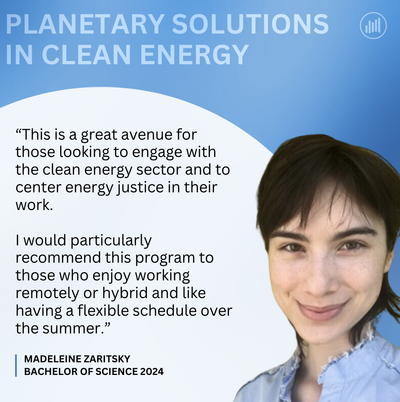Decolonizating the Global Racial Empire

The Planetary Solutions in Clean Energy Internship and Fellowship Program (PSiCE) offers summer research and internship opportunities to students at Yale who are committed to advancing and pursuing a career in the clean energy field. This year we spoke with students in our second cohort to learn about their inspiration, goals, and experience through the program. Droughts, fires, floods, sea-level rise, heat waves, and extreme weather are only some of the ongoing challenges relating to climate change that continue to deepen and intensify with every new season.
Madeleine Zaritsky believes clean energy, while a clear rhetorical term to contrast with fossil fuels, is somewhat of a misnomer. No form of energy production is completely “clean.”
“For energies such as solar and wind, significant environmental degradation (along with human rights abuses and unsafe labor conditions) occurs along the supply chains of their production and that of associated batteries".
However, these renewables are absolutely critical to our continued living on a habitable planet. The deathly impacts of the climate crisis are already making themselves known, disproportionately impacting environmental justice communities and communities in the Global South. Building out renewable energy can significantly mitigate this crisis, and most importantly, through a just and reparative transition, can address critical components of continued racial and socioeconomic injustices across the globe.
“This growing energy sector also presents an opportunity to build out supply chains that do not replicate the human rights abuses of the fossil fuel sector or that continue the externalization of environmental harm to environmental justice communities during the fuels’ production.”
Madeline, an Environmental Studies major with a concentration on Environmental Justice, set to complete her undergraduate education in December 2024, is taking part in the Planetary Solutions in Clean Energy Internship and Fellowship Program (PSiCE) which offers summer research and internship opportunities to students at Yale who are committed to advancing and pursuing a career in the clean energy field.
Students in the 2023 cohort shared their inspiration, goals, and experience through the program.
“This program offers both mentorship and monetary support in a field with enormous growth potential. Through weekly zoom check-ins and an in-person field trip to areas of energy sector-significance near New Haven, it provides a great support network throughout one’s internship and a chance to meet other students interested in this work. It was a fantastic opportunity to learn from the work of other interns and fellows in this program as well as the organizations they were working with.”
Madeline said a just clean energy transition includes a decolonization and dismantling of what scholar Olúfẹ́mi Táíwò calls the “Global Racial Empire” and is led by communities of color and low-income communities which have been fighting the disproportionate harms created by fossil fuels in their communities, and leading environmental justice work for years. Furthermore, this transition must be one that is regenerative and reparative, not just sustainable.
“One that leads to a massive and equitable redistribution of wealth; and one that does not repeat or build off of existing injust modes of energy production. What is critical, though, is that I am a newcomer to this work and that my view of a just clean energy transition will continue to change as I learn from others working to achieve racial justice, socioeconomic justice, energy justice, etc.“
Speaking of learning more, through her internship with PSiCE, Madeline has been working with Indigenized Energy, which helps Tribal Nations pursue energy sovereignty with a focus on expanding solar.
“I have been focusing on building an impact investing slide deck that highlights a novel financing system this organization is looking to pilot in the context of the Inflation Reduction Act. I have also been conducting background research and assisting with grant applications for new solar projects.”
All told, PSiCE was a win for Madeline. It exposed her, she said, to sectors of the renewable energy field that she had not heard much about in an academic setting. The program broadened her understanding of what energy justice work can entail.
“This is a great avenue for those looking to engage with the clean energy sector and to center energy justice in their work. I would particularly recommend this program to those who enjoy working remotely or hybrid and like having a flexible schedule over the summer".
